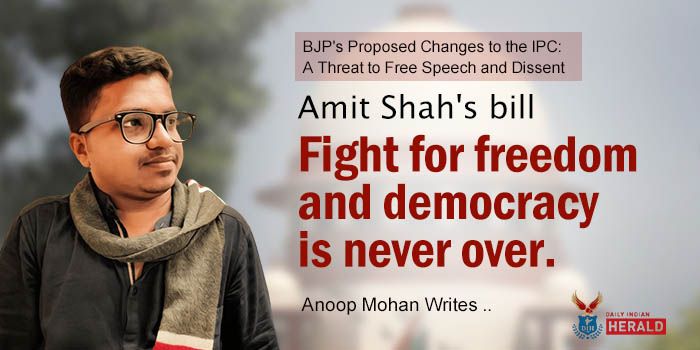
The BJP-led government’s proposed changes to the Indian Penal Code (IPC) are a cause for concern for many. The changes would make it a crime to “excite or attempt to excite” secession or armed rebellion, or to “encourage feelings of separatist activities”. This could be used to stifle legitimate political dissent, and to target minority groups and activists or an agenda to The current Section 120 A of IPC only criminalizes the act of hiring or conniving at the hiring of persons to join an unlawful assembly.
The proposed changes in Bharatiya Nyaya Synhitha (BSN) would go much further, making it a crime to simply “excite or attempt to excite” secession or armed rebellion. This is a very broad and vague definition, and it is unclear what would constitute “exciting” or “attempting to excite” such activities. For example, could a person be arrested for giving a speech that criticizes the government and calls for greater autonomy for a minority group? Could a person be arrested for writing an article that argues that India should be a secular state? It is possible that these activities could be construed as “exciting” or “attempting to excite” secession or armed rebellion, even if they are not intended to do so.
The proposed changes to Section 150 of the BNS are also concerning because they could be used to target political opponents, minority groups and activists. For example, the government could use the law to arrest and detain leaders of separatist movements, or to silence critics of the government. This would have a chilling effect on free speech and dissent in India.
The BJP-led government has argued that the proposed changes to Section 150 of the BNS are necessary to protect India’s sovereignty and unity. However, it is clear that the changes could also be used as a political tool to stifle dissent. It is important to carefully scrutinize the proposed changes before they are implemented, to ensure that they are not used to suppress legitimate political activity.
In addition to the concerns mentioned above, there are also some practical problems with the proposed changes to Section 150 of the BNS. For example, it is not clear who would be responsible for determining what constitutes “exciting” or “attempting to excite” secession or armed rebellion. This could lead to arbitrary and discriminatory enforcement of the law. The BJP has a history of using the law to silence its critics. In recent years, the government has arrested and charged journalists, activists, and students under a variety of laws, including sedition and UAPA. The proposed changes to Section 150 would give the government even more power to target its critics.
India has a long history of political criticism and free speech. The freedom to dissent is essential to a healthy democracy. The proposed changes would be a major setback for free speech and political dissent in India. The freedom struggle was a long and bloody battle for independence from British rule. It was also a battle for the right to free speech and political dissent. The freedom fighters who fought for India’s independence would be appalled by the BJP’s attempt to silence dissent.
The BJP’s bill to change Section 150 is a dangerous attack on free speech and political dissent. It is a betrayal of the legacy of the freedom struggle. It is a reminder that the fight for freedom and democracy is never over.
Adoor Aug 12, 2023
Anoop Mohan
Indian Youth Congress










